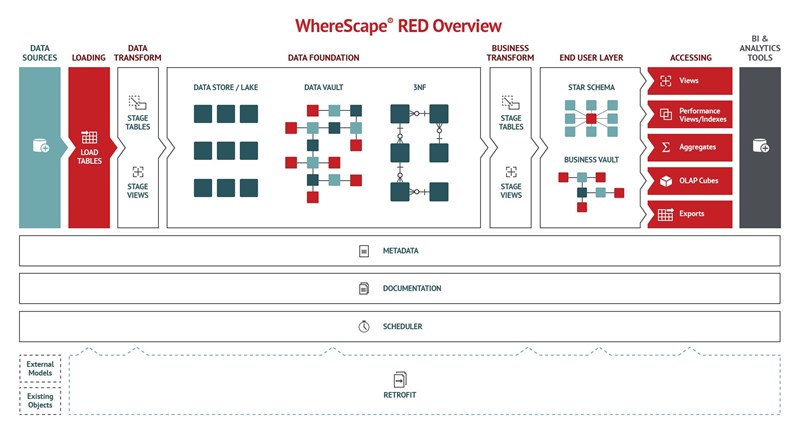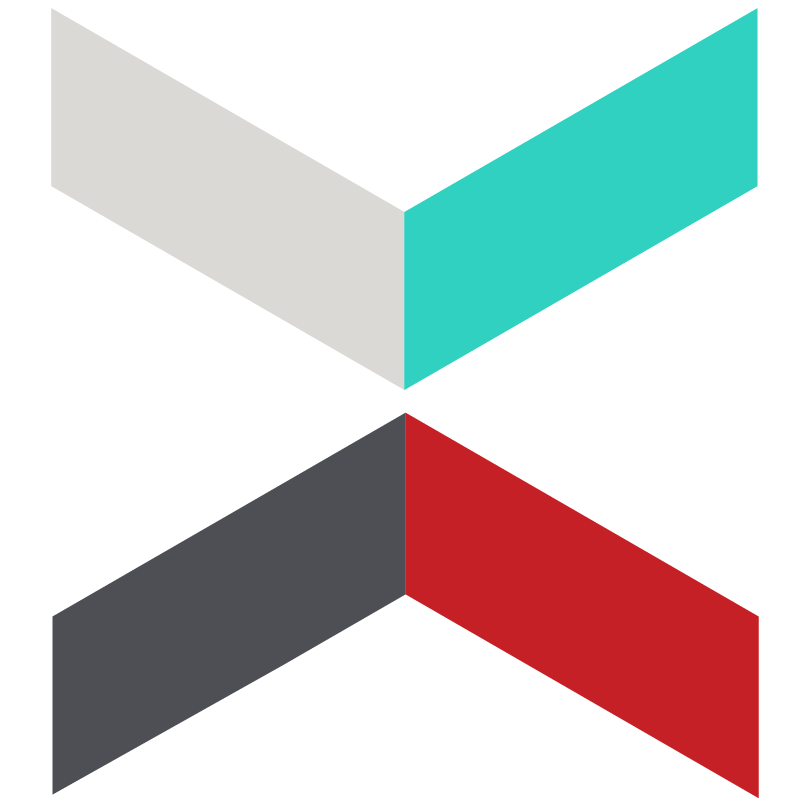General Requirements
To get started with WhereScape RED you will need a Windows PC for the WhereScape RED client, access to a supported RED metadata database (eg. SQL Server, Oracle) and access to a supported data warehouse database (see list below for details). In addition, a platform is required to run at least one WhereScape RED scheduler that complies with the minimum requirements listed below and with network connectivity to the metadata, data warehouse and source databases.
For evaluation these can all be on the same platform
Workstation Minimum Requirements:
Scheduler Server Minimum Requirements:
Database Engines and Versions Supported for the WhereScape Red Repository:
|
Data Sources Supported:
Target Database Platforms:
|
Overview
WhereScape RED unites source system exploration, ELT, dimensional and normal-form target schema design, and dependent cube-building construction with an integrated operations and management environment and a metadata repository, allowing small teams of data warehousing professionals to implement data warehouses using agile methodologies, practicing iterative-build-and-test disciplines and involving key end-users in the build process. All build-and-operate metadata is customizable, rewritable and stored in a central managed repository, bringing application programming discipline, tool integration and automated documentation generation to data warehouse build projects.
WhereScape RED can be driven by WhereScape 3D or used as a stand-alone Integrated Development Environment (IDE) in environments with advanced BI planning models.
Whether a team is focused on an enterprise data warehouse, a standalone data mart, a tier of reporting services, or the renovation or migration of an existing warehouse or mart, WhereScape RED provides an integrated, cost-effective alternative to complex and expensive do-it-yourself development environments, with team development support, and project-level control, at a fraction of the cost of the alternatives.

WhereScape RED extracts data from database links, flat files, XML, and any ODBC compliant data source, including: Oracle, SQL Server, DB2, Teradata, Sybase, Informix, Progress, PostgreSQL and MySQL.
WhereScape RED builds data warehouses in all major databases used for data warehouses. See the list of Target Database Platforms above. WhereScape RED also provides automatic generation of Microsoft SSIS packages and Analysis Services cubes.
Ultimately, WhereScape RED’s integration, speed and effectiveness enables data warehousing teams to produce data warehouses and marts that deliver value quicker, remain relevant to business users longer, and can be enhanced and modified nearly instantaneously – data warehouses right, now.
If you’re interested in understanding the details of how WhereScape RED is implemented, and how it works, you can read the product brochure, the product data sheet, or the architecture overview, or contact us and we can organize an evaluation copy of WhereScape RED.
If you’d like to know why more than 700 companies use WhereScape RED as their data warehousing IDE, you can see what the analysts have to say about WhereScape, its products and its commitment to the data warehousing market.
Design
Dimensional Models are, because of their inherent legibility, the essence of end user interaction with the data warehouse.
Normalized data models future proof data warehouses and are the key component for large scale enterprise data warehouses.
Data Vaults are a detail oriented, historical tracking and uniquely linked set of normalized tables that support one or more functional areas of business. It is a hybrid approach encompassing the best of breed between 3rd normal form (3NF) and star schema. The design is flexible, scalable, consistent and adaptable to the needs of the enterprise.
WhereScape RED supports both normalized and dimensional models as well as their variants such as snowflakes and data vaults. The choice of model is not a simple one – experience with a particular design approach should not be the primary reason for applying that approach. Dimensional modellers will stress their close linkage to users and requirements. Their detractors will point to wastage and repeated effort. Normalized modellers focus on the flexibility of the model, while their detractors highlight the time taken to create an additional layer.
In WhereScape’s opinion different techniques should be used for different use cases. We have seen each of the approaches successfully implemented for a range of business problems – and numerous examples where they have been less than optimally implanted. The decision as to which technique to adopt for a particular organization has multiple dimensions: stability of business problem, maturity of analysis, reputation of IT, funding models etc. WhereScape Consulting can assist with this decision making.
Models (both dimensional, normalized or vault) can be designed, purchased or derived. If they are designed or purchased they need to be validated with real source data to assure they can be populated. If they are derived from source system data, they need to be validated to ensure they are flexible enough to meet on going requirements. WhereScape 3D is an ideal tool for this exploration process.

